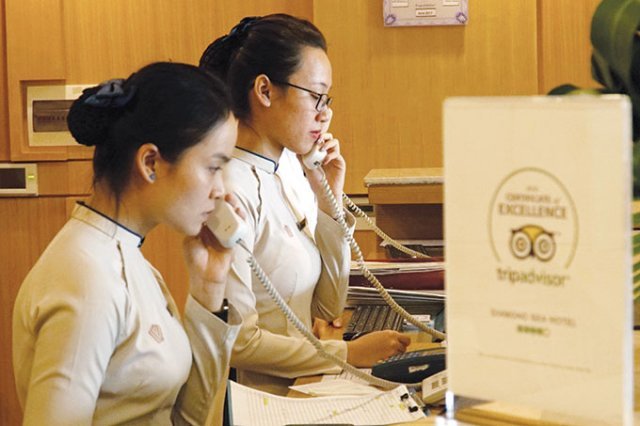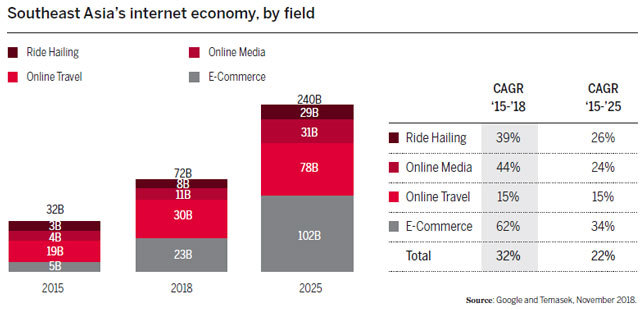 |
Criteo S.A., an advertising platform for the open internet, last month announced a partnership with Tugo, one of Vietnam’s leading travel startups, and five major national airlines in the region, to create a seamless purchase experience for premium tour programs and meet the growing demand for premium travel services in Vietnam.
The country’s online travel market has bloomed in recent years, according to the e-Conomy SEA 2018 report from Google and Temasek released in November last year, which predicted a sharp increase in the value of Southeast Asia’s online tourism market from $21.6 billion in 2015 to $89.6 billion by 2025, of which Vietnam will account for 10 per cent, or some $9 billion.
SEIZING UPON TRENDS
Online travel agencies (OTAs) have thrived in Vietnam, with many travel companies, after making substantial investments in online tourism, earning increasingly high revenue and setting ambitious targets.
As part of the one-year partnership, Criteo will provide retargeting solutions that enable Tugo to better reach target customers and promote premium tours with flights from partner airlines. “We hope to provide premium travel experiences that satisfy the needs of the modern Vietnamese traveler, cooperating with major national airlines in the Asia-Pacific region over high-quality transport and accommodation,” Mr. Nguyen Minh Bao, Founder and CEO of Tugo, said at the signing ceremony.
Since its foundation, Tugo has only focused on online sales channels and digital marketing through Criteo, Facebook, Google, and Insider, among others. “Our online marketing activities through these channels cost $4 million in 2018,” Mr. Dinh Hieu Nghia, Marketing Manager at Tugo, told VET. “For instance, we use Criteo’s proprietary dynamic retargeting technology, Dynamic Retargeting, and Facebook Travel Ads, which use AI analysis technology to identify customer behavior on the internet then post more advertising and communication messages to target customers. These enabled us to cater to 15,000 travelers last year. After setting a principal goal of 100 per cent growth each year, we expect customer numbers to reach 30,000 this year.”
Launched in 2016, another local OTA, Begodi, offers hotel bookings in many locations, whether well in advance or at the last minute. It selects hotels under criteria such as price, type, rating, and promotions, and can change bookings easily.
Revenue in 2018 tripled the figure in 2017, with more than 2,000 customers. “The first quarter of 2019 has seen an even higher jump in terms of sales, as we continue to significantly raise investment levels,” said Mr. Thai Quynh, Director of Sales and Marketing at Begodi. “We invested heavily in digital marketing from the get-go and this has paid off quite nicely. All the digital metrics, like click through rates, repeat rates, conversion rates, and others are available for us to dissect and analyze in order to make better business decisions.”
MARKET FLOURISH
The Google and Temasek report also noted that OTAs offer tourists the ability to quickly compare and find the best tourism products and prices and more conveniently make reservations. OTAs in Vietnam, including online airfare bookings and hotel bookings, are growing quickly, with Vietnam ranking in the top 4 in ASEAN in terms of growth. Significant improvements in the user experience, through mobile interfaces and applications and the growing popularity of smartphones, have seen many OTAs expand their operations.
The growing digital economy has changed how consumers research and book holidays and where they go, according to Mr. Ittai Chorev, CMO of Agoda. Travelers now have access to thousands of destinations and millions of accommodation options, whether they seek hotels, hostels, homes, or tree-houses. “By using technology to optimize marketing and personalize the booking experience, Agoda’s own inventory in Vietnam has grown from a couple of thousand properties in 2014 to over 30,000 in 2019, while globally we now have over 2 million properties, all of which we strive to offer at the best possible price,” he told VET.
International OTAs like Agoda can help property owners large and small in the country’s major tourism cities like Hanoi, Hue, Da Nang and Vung Tau attract travelers from Russia, Australia, or Europe and everywhere in between. “Working with local hoteliers and inventory partners, we are bringing travelers to Vietnam and helping Vietnamese travelers explore the world,” Mr. Chorev said. “One other point is that travelers rely upon other like-minded travelers’ reviews to help influence their next travel choice.”
Agoda’s booking data reveals that South Koreans, Malaysians, and Thais all rank Vietnam as a top 10 destination and the country is growing both as a place to visit and as a source market. Mr. Chorev explained that markets like Vietnam or China have totally skipped credit card ownership and gone straight to mobile payments, meaning there are both huge challenges and opportunities for companies like Agoda. Without a doubt OTAs are here for the long run, he said, to meet global tourism growth and specifically growth across Asia Pacific, which is the fastest-growing source region.
Vietnam’s growing digital economy is driving online travel bookings on websites and mobile apps as people become more mobile and app-savvy. This trend was observed in Criteo’s The Big App Commerce Opportunity in Vietnam study, where more than four out of five consumers said they prefer to purchase products and services on mobile apps compared to mobile websites.
With the rise in internet penetration and smartphone penetration, travelers will continue to prefer OTAs to traditional travel agencies due to convenience, the range of properties, promotional offers, and easier payment methods. In 2017, 71 per cent of foreign tourists heading to Vietnam searched for information online, while 64 per cent booked local tours online, according to figures from the Vietnam Society of Travel Agents (VISTA).
OBSTACLES REMAIN
 |
The rise in low-cost carriers, internet penetration, and smartphone adoption has led to rapid growth in the online tourism industry, which is dominated by foreign OTAs, who currently hold up to 80 per cent of Vietnam’s online travel market share, according to the Vietnam National Administration of Tourism (VNAT). The major growth drivers for foreign agencies include access to capital, partnerships with hotels, and promotional programs such as discounts and special offers.
When compared to their foreign counterparts, domestic OTAs face ongoing issues such as a lack of technological solutions, few partnerships with hotels, and financial restraints, which allow foreign OTAs to offer higher discounts and better sales promotions, according to Mr. Koushan Das, Assistant Manager, Business Intelligence, at Dezan Shira & Associates. Competing with foreign OTAs in areas such as capital, promotional offers, and marketing is tough for domestic firms. But they can focus on issues such as improving customer service, optimizing technology, and service diversification, such as providing transportation and tour guides, to remain competitive.
A main barrier for Vietnamese OTAs is accessibility. Mr. Quynh from Begodi acknowledged that travel is a very competitive sector, now more than ever for newcomers. “It’s not easy to establish working relationship with stakeholders, for example channel managers,” he said. “There are many choices in terms of technology in the market, but sadly there are only a few popular options.”
He noted that the focus on market share as the primary indicator of whether or not an OTA is successful also presents a challenge for them. This approach pushes many businesses to forgo profit and undercut pricing to gain market share in the fastest possible way. With so many OTAs and costs driven down, sometimes to even below their purchase price, customers are spoilt for choice. Customer loyalty, hence, is likely to decline. This is also why Begodi only focuses on a niche market, which is luxury.
OTAs are without doubt the future, according to Mr. Quynh. “Consumers will turn to platforms where they get the quickest travel advice and can make bookings in a matter of seconds,” he said. “Utilizing technology is also cost effective for companies to manage all the processes. The biggest challenge for Tugo at the moment is changing customer mindsets, encouraging them to differentiate between OTAs and traditional travel agencies and using the former.
However, many industry analysts have pointed out that OTAs in Vietnam are only in their initial stages of operation and the market is yet to take a clear shape, so online service provision remains open. If OTAs know how to approach customers and adopt a long-term strategy, Vietnam still holds significant potential.
Moreover, the government issued Resolution No. 103 in October 2017 on a program of action to implement Politburo Resolution No. 08, which focuses on the main tasks and solutions to effectively exploit the advantages and connect and enhance the value of tourism services. The Resolution notes that it will boost digital technology applications to support travelers and focus on developing apps to assist travelers in creating itineraries and make booking and paying for online travel services more convenient. VN Economic Times
Khanh Chi & Linh Ngoc
 Online travel agencies (OTAs) in Vietnam are striving to capture the opportunities created by the country's booming tourism market.
Online travel agencies (OTAs) in Vietnam are striving to capture the opportunities created by the country's booming tourism market.